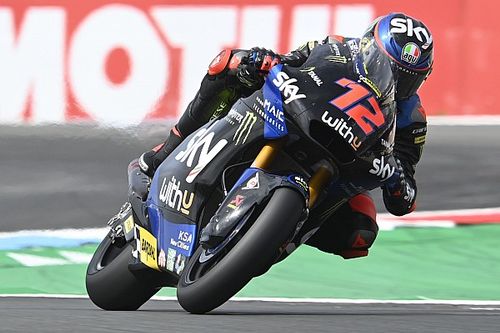How to become a Controls Engineer in F1 - Qualifications, skills & more
We spoke to Haas F1 Team's David Sloan to find out what a Controls Engineer does, how to become one, and what skills you need for the job.

Controls Engineers in Formula 1 are responsible for monitoring car performance, ensuring systems like the brakes, differential, clutch and more are all operating correctly.
To find out more about what a Controls Engineer does, what qualifications you need, and how to become one, we spoke to David Sloan – Controls Engineer for Haas F1 Team – to find out more.
What is your role?
The Control Systems Engineers are responsible for operating the various on-car control systems, and analysing their performance, working with the Race Engineers and drivers.
What are your responsibilities and main jobs?
I monitor the systems during on-track running through the telemetry, ensuring everything is working as expected and providing diagnosis of any issues that arise.
Specifically, I will be looking at the braking systems, differential, steering wheel, clutch settings and start performance, and tuning them with feedback from the driver and Race Engineer.
I must ensure that everything is configured according to the FIA rules, ensuring legality at all times, and I also work closely with Ferrari engine, ERS and electronics engineers on many aspects of the car systems.
How do you become a Controls Engineer?
My background is in software development. I started outside of motorsport, but my first motorsport job at FOM was purely writing software. As I moved from job to job I was exposed to various aspects of the electronics and control systems used in F1, so I moved in that direction.

Nikita Mazepin, Haas VF-21, in the garage
Photo by: Andy Hone / Motorsport Images
What qualifications do you need?
An engineering degree is usually a requirement.
What should you study in school?
At school I studied English, maths, physics, chemistry and biology.
What other skills are useful?
When you travel, you spend a lot of time with your colleagues, so it’s important to work well in a team, and having a sense of humour can help. Being able to prioritise and manage your time is also important, as there isn’t always as much available as you’d like.
I don’t think being a fan of motorsport is essential, although some familiarity with the sport is always helpful.
Do you get to go to races?
Yes, my role is a ‘travelling’ one, so I go to all the races and tests.
What does a day at work look like for a Control Engineer?
Between events, the days are fairly typical ‘office’ days – analysing data from the last event, writing reports and documenting what went well and where improvements can be made, and then looking forward to the next event, preparing the initial electronic and software set-ups.
At the circuit, each day we’ll have meetings and there will be fire-up data to check, to ensure the car is built and configured correctly for each session, and then debriefs from the driver and changes after each session to gain maximum performance from the car. However, there are many variables - such as red flags and the weather for example - which means the day may not go according to the plan, and a degree of flexibility is required.
My role is almost exclusively computer-based, and although I work closely with the Systems Engineer who will be looking after the electronics from the hardware/sensor side of things, there’s not much practical work typically.
This article was created in partnership with Motorsport Jobs. Find the latest jobs in motorsport, as well as jobs with the Haas F1 Team, on the Motorsport Jobs website.

Related video

Previous article
How Ferrari has brought the best from F1’s smooth operator
Next article
What Alpine found to turn around Ocon's F1 slump

How to become a Controls Engineer in F1 - Qualifications, skills & more
Trending
Trending Today
How Ferrari has brought the best from F1’s smooth operator
As a young boy, Carlos Sainz was schooled by his father in the special folklore surrounding Ferrari in Formula 1. Now an established grand prix ace – and a Ferrari driver to boot – Sainz opens up to BEN ANDERSON about driving for the team of his childhood hero, and of his own boyhood dreams
How Hungarian GP thriller sounded alarm bell for F1 2022 cars
OPINION: The 2021 Hungarian Grand Prix may not have been a thrill-a-minute overtaking fest, but it's a race that will live long in the memory as one of the best of the current era of Formula 1. And as F1 moves to regulations in 2022 aimed at boosting overtaking, Hungary showed the balance it must strike with its new machinery as not to deny similarly tense spectacles
Was Hamilton's Hungary solo start a good or bad look for F1?
OPINION: Different perspectives had Lewis Hamilton’s solo second standing start in Formula 1’s 2021 Hungarian Grand Prix as fabulous or farcical. But did it make the championship appear too silly for the sake of a moment of high-charged sporting drama?
Why unseen Hungary heroics could be the making of F1's most overlooked driver
The chaotic start to the Hungarian GP set the scene for F1's less heralded drivers to make a name for themselves. Esteban Ocon did just that to win in fine style, but further down the order one driver was making his first visit to the points and - while the circumstances were fortunate - took full advantage of the chance presented to him
Hungarian Grand Prix Driver Ratings
This was race that showcased the best and worst of Formula 1, producing a first time winner and a memorable comeback to a podium finish. Avoiding trouble at the start and astute strategy calls were key to success, but where some drivers took full advantage, others made key errors that cost them dearly
The “heart-breaking” call that led to Ocon’s Hungarian GP triumph
Set to restart the red-flagged Hungarian Grand Prix in second, Esteban Ocon had some doubts when he peeled into the pits to swap his intermediate tyres for slicks. But this "heart-breaking" call was vindicated in spectacular fashion as the Alpine driver staved off race-long pressure from Sebastian Vettel for a memorable maiden Formula 1 victory
The F1 champion who became an Indy king in his second career
Emerson Fittipaldi’s decision to go racing with his brother led to him falling out of F1, but he bloomed again on the IndyCar scene. NIGEL ROEBUCK considers a career of two halves
Why Mercedes is pleased to be in the Hungary hunt at a 'Red Bull track'
Mercedes ended Friday practice at the Hungaroring with a clear gap to Red Bull thanks to Valtteri Bottas’s pace in topping FP2. But there are other reasons why the Black Arrows squad feels satisfied with its progress so far at a track many Formula 1 observers reckon favours Red Bull overall






























